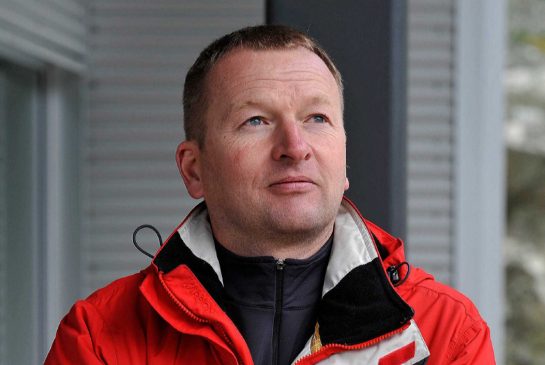Canadian luge coach says track warmed unfairly, but Canada won’t protest race
Warmed luge track caused teams running last to lose time, Russians ensured their team was part of early group, coach charges

Canadian luge coach Wolfgang Staudinger says he believes the temperature of the sliding track was raised enough to slow down teams who slid near the end of Thursday's competition, including Canada.
SOCHI, RUSSIA—Canada clearly believes they were jobbed by Russian track officials in Thursday’s team relay luge. The official race data adds credence to the charge.
The Russians slid in the middle of the final pack, and won silver. The Canadians went in the final ranked group of five, and finished fourth.
In between, something happened to the track, national team coach Wolfgang Staudinger says.
“Canada was silver at the top, but the further we went down, the slower we got. That’s a clear sign that the track slowed down dramatically,” Staudinger said after the race. “It’s always hard to prove, but I’m long enough in the business that I can tell you when people, especially the Austrians who won silver yesterday, were dropping a half second, that’s not normal.”
Piping runs underneath the luge track. Staudinger is suggesting the temperature of the track was raised between the time the Russians and their major competitors slid, slowing the track considerably.
At 8 p.m., as the race was starting, the track temperature was -2.7C.
By 9 p.m., just as the final sleds, including the Canadians, were going, the temperature had risen considerably, to -1.9C.
While the track temperature was rising, the air temperature was dropping from 8C to 7C.
Staudinger is basing his supposition on the fact that the Russian team chose not to race in the final World Cup event of the season, surrendering their ranking.
Instead of sliding last with the best five teams in the world, the Russians were pushed up in the starting order.
“For me, that was already a red flag,” Staudinger said.
Canada dropped off dramatically at the tail end of their final run. The gold-medallist Germans, sliding just before the Canadians in the final group, set an overall track record.
Staudinger waved that fact away, saying, “The Germans are so strong, they can overcome a handicap like this.”
He further suggested that the Germans’ usual second-and-a-half margin of victory had been reduced to a single second.
On Friday morning, Gilbert Felli, the Olympic Games executive director, challenged Canada to make an official complaint if they have any proof.
“(I)n every competition, you always have people believing that people have tricks,” Felli said. “I think that you should let it go unless you’ve got proof.”
Grudgingly, that’s what the Canadian Luge Association plans.
“At this point, there’s really nothing we can do about it,” CLA high performance director Walter Corey said on Friday. “At this moment, those are Wolfgang’s comments. We’re going to support our coach.”
Corey was asked if he believed something had happened.
“You can see some tendencies, right,” Corey said carefully. “The Austrians were very vocal to our staff as well.”
After a silver in doubles, the Austrians finished seventh in the relay. They raced last, right after Canada.
Corey said Canada will press for a rule change in which the best teams go down the track first, which would prevent any shenanigans in the boiler room.
That’s cold comfort to Canadian competitors here, who may well have been undone by an anonymous Russian engineer rather than their competitors on the field of play.
Top News
- Defence-first approach has Canada in gold-medal game: Feschuk
- NEW Swedes will have to elevate their game against Canada: Cox
- Andrew Leslie, PMO discussed possible jobs, emails show
- Vintage Rob Ford: Top 7 items he tried to shoot down at council
- Updated Sears clears out of Eaton Centre, Sherway Gardens
- Who is Arthur Chu? A Jeopardy champion’s dangerous game
- Canadian killed in attack on Somalia’s presidential palace
- Video Ukraine leaders reach fragile compromise, protesters issue ultimatum
commercial promo
commercial promo
-

The Cottage Country Winter Staycation: Championing the season in an Olympic year
-

Prague puts Europe at your proverbial doorstep
-

Porch-side play to tell tale of Toronto’s first black postman
-

The Kit: Cute Canadian couples get street styled
-

The Grid: The French liqueur that's become a hot commodity in Toronto bars
From The Homepage
- Defence-first approach has Canada in gold-medal game: Feschuk
- NEW Swedes will have to elevate their game against Canada: Cox
- Andrew Leslie, PMO discussed possible jobs, emails show
- Vintage Rob Ford: Top 7 items he tried to shoot down at council
- Updated Sears clears out of Eaton Centre, Sherway Gardens
- Who is Arthur Chu? A Jeopardy champion’s dangerous game
- Canadian killed in attack on Somalia’s presidential palace
- Video Ukraine leaders reach fragile compromise, protesters issue ultimatum




We value respectful and thoughtful discussion. Readers are encouraged to flag comments that fail to meet the standards outlined in our Community Code of Conduct. For further information, including our legal guidelines, please see our full website Terms and Conditions.
Commenting is now closed.